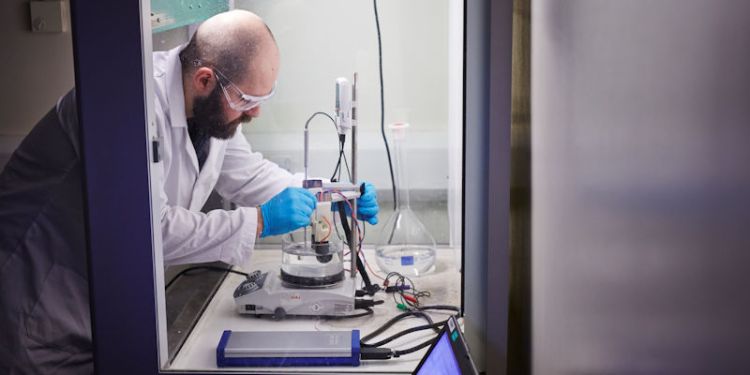Corrosion and flow assurance
Research approach

In the Institute of Functional Surfaces (iFS), we are committed to supporting and accelerating the transition to a low carbon future through the application of strong engineering science. We have experts encompassing the fields of system design, electrochemistry, numerical modelling, physical chemistry and surface/materials science and characterisation, providing both a unique environment and approach to our research. The distinctive aspects of our approach to research are outlined in the following sections.
Custom designed in-situ flow cells
In corrosion and mineral scaling processes, there is significant value in the extraction of real-time, in-situ measurement. This enables us to see transitions in time. Over the last 10 years, we have worked with our technicians to design a number of fluidic cells capable of a variety of in-situ measurement, encompassing electrochemical, diffraction, spectroscopy and optical methods. Recently designed systems include:
- In-situ Raman flow cells for determination of mineral/corrosion product formation and dissolution kinetics on steel surfaces.
- In-situ synchrotron x-ray diffraction flow cell for rapid measurement of corrosion products formation and transitions. We have also recently developed a high temperature/high pressure version of this flow cell.
- A once-through, constant composition electrochemical milli-fluidic flow cell for evaluating corrosion behaviour in well controlled chemistries. The cell can also undergo rapid transitions in fluid chemistry to look at the effects of fluctuation in pH and/or inhibitor concentration.
- A once-through, constant composition visualisation flow cell for the assessment of scale inhibitors or quantification of heterogeneous nucleation of growth of minerals on steel surfaces.
Bespoke methodologies and system design
In iFS we continuously develop new methods and working closely with our technicians, and academic/industrial partners to design new equipment. These methods and systems provide either unique insight into the mechanisms and enable us to perform experiments which provide data that is translatable to field operations. Recent work includes:
- Design of a milli-fluidic cell for progressive dilution of inhibited acid with formation brine to understand and model acidizing flow-back processes.
- Design of bespoke under-deposit corrosion test cells to measure chemical transport.
- Design of bespoke top of line corrosion cell and miniature electrodes for real-time in-situ corrosion measurement in condensate.
- 3D printed components with in-situ acoustic emission and electrochemical measurement integrated into our flow loops.
- Bespoke in-situ abrasion rig for periodic film/corrosion product removal.
Combined experimental and modelling approach
iFS have complementary expertise in numerical modelling and corrosion/mineral scaling experimentation. We have developed comprehensive prediction models for CO2 corrosion in single phase flow and top of line corrosion, which have been verified and validated using our experimental facilities.
We recognise the value of mechanistic and semi-empirical numerical models in their ability to decouple and systematically understand the effect of key operating conditions and environments on corrosion and scaling. In addition, such models allow determination of corrosion behaviour beyond what is capable in some laboratory environments, and provide an effective means of corrosion prediction in larger scale systems encountered in the field.

